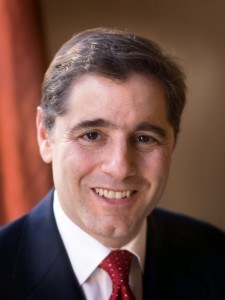In a dramatic departure from the former Federal Communications Commission’s largely “hear no evil, see no evil” oversight, Julius Genachowski, the new Chairman of the Federal Communications Commission, is a downright activist.
Genachowski, over the course of several interviews given this week, has made it clear that he sees major problems in the American broadband industry — it’s too expensive, it’s not competitive enough, and its widespread availability is absolutely critical to the economic success of the United States in coming years. He’s made it clear broadband will be the most important issue before the agency for the immediate future.
“It’s tremendously important. I’m convinced that broadband is our generation’s major infrastructure challenge, akin to what railroads were, what the highway system was and universal electricity. This is the platform that will determine whether the country can compete in the 21st century. If we get this right, our broadband infrastructure will be an enduring engine for job creation, economic growth, investment, innovation, so it’s essential,” Genachowski said in an interview published today in The Wall Street Journal.
Although short on specifics in most of the interviews given to date, Genachowski has signaled his interest in preserving the concepts of Net Neutrality — providing open and equal treatment of Internet traffic without favoring or throttling traffic.
“The openness of the Internet has been a big driver of that. And it is important that we preserve that openness in order to drive investment, innovation, job creation and economic growth,” he said.
With the departure of the former FCC Chairman Kevin Martin earlier this year, Genachowski will mirror much of the Obama Administration policies and their telecommunications agenda.
Martin’s FCC, with a Republican majority, exercised a deregulatory approach to oversight, and was frequently criticized for not protecting consumer interests. But Martin did routinely clash with the nation’s cable television operators, in his unsuccessful effort to force them to provide a-la-carte cable television programming tiers. Martin’s leadership also brought about heightened oversight of “decency” policies impacting broadcasters, and resulted in substantial fines for radio and television stations that violated language or decency standards. Most agency watchers summarize the last eight years of telecommunications policy as generally industry friendly, particularly to telephone companies, and mildly hostile to cable. The Commission also sought to permit an increase in ownership concentration of the nation’s radio and television services, and approved mergers routinely, including one between former competing satellite radio providers XM and Sirius.
Genachowski’s FCC is expected to substantially change its regulatory approach, but only over time.
Although it will maintain an activist approach to broadband issues, Genachowski believes a top-down ‘agency makeover’ is required to prepare the FCC to meet the challenges of the 21st century.
“There are real challenges given the state of the infrastructure at the agency. As an example, there are literally millions of pages of documents that should be available to the public, and technically are because people can come in and look them up, that aren’t in digital form at all. They’re in paper. Some of these are historical documents, but there’s a huge resource downstairs in the pubic reading room that has something like 7,000 linear feet of paper that we really do need to digitize and put online. There’s a lot of paper that is online but not in machine-readable format, it’s not searchable,” he said.
Most FCC watchers believe the agency will move forward on several issues in the next 12-24 months:
- A review of the Universal Service Fund (USF), which collects several dollars from every telephone customer in the United States to help underwrite and defray expenses of the nation’s most rural and disadvantaged telephone subscribers. The USF has been roundly criticized for collecting an enormous amount of money, and squandering it on projects that go well beyond the Fund’s original intent, resulting in considerable waste, fraud, and abuse. Genachowski’s FCC will be asked to consider using USF money to deploy and/or underwrite broadband service in areas not economically viable enough for private companies to provide service.
- A review of the state of the competitiveness in the broadband, telephone, and wireless telephone industries, with particular emphasis on the latter. Wireless phone companies like Verizon Wireless and AT&T Mobility are already under scrutiny for their exclusivity agreements with telephone equipment manufacturers, and their attempts to hold consumers’ hostage by refusing to permit them to reactivate their phones on other company’s networks.
- A review of applications and filings by broadcasters relating to low power radio and television, improving reception for digital over the air television signals, indecency complaints, and mergers and acquisitions in the industry.


 Subscribe
Subscribe

This is encouraging, but let us hope he is able and can deliver what’s best for the consumer.
“A review of the state of the competitiveness in the broadband, telephone, and wireless telephone industries, with particular emphasis on the latter. Wireless phone companies like Verizon Wireless and AT&T Mobility are already under scrutiny for their exclusivity agreements with telephone equipment manufacturers, and their attempts to hold consumers’ hostage by refusing to permit them to reactivate their phones on other company’s networks.” I would love to see something come out of this. These cell companies have been gouging people for years on over priced phones and plans not including proprietary equipment that you need to buy to use the… Read more »
Congress will have a large say in any policy change. Since our lovely Senators and Congressmen get paid huge sums of money via campaign contributions from the very companies the FCC is trying to regulate I have my doubts much will change. Will AT&T, Verizon, and Time Warner sit around on their hands while the FCC pushes net neutrality?
It would be nice, but obviously that isn’t going to happen.
The lobbyist and big corporate money will write out nation’s broadband policy unless we stand up and take charge.